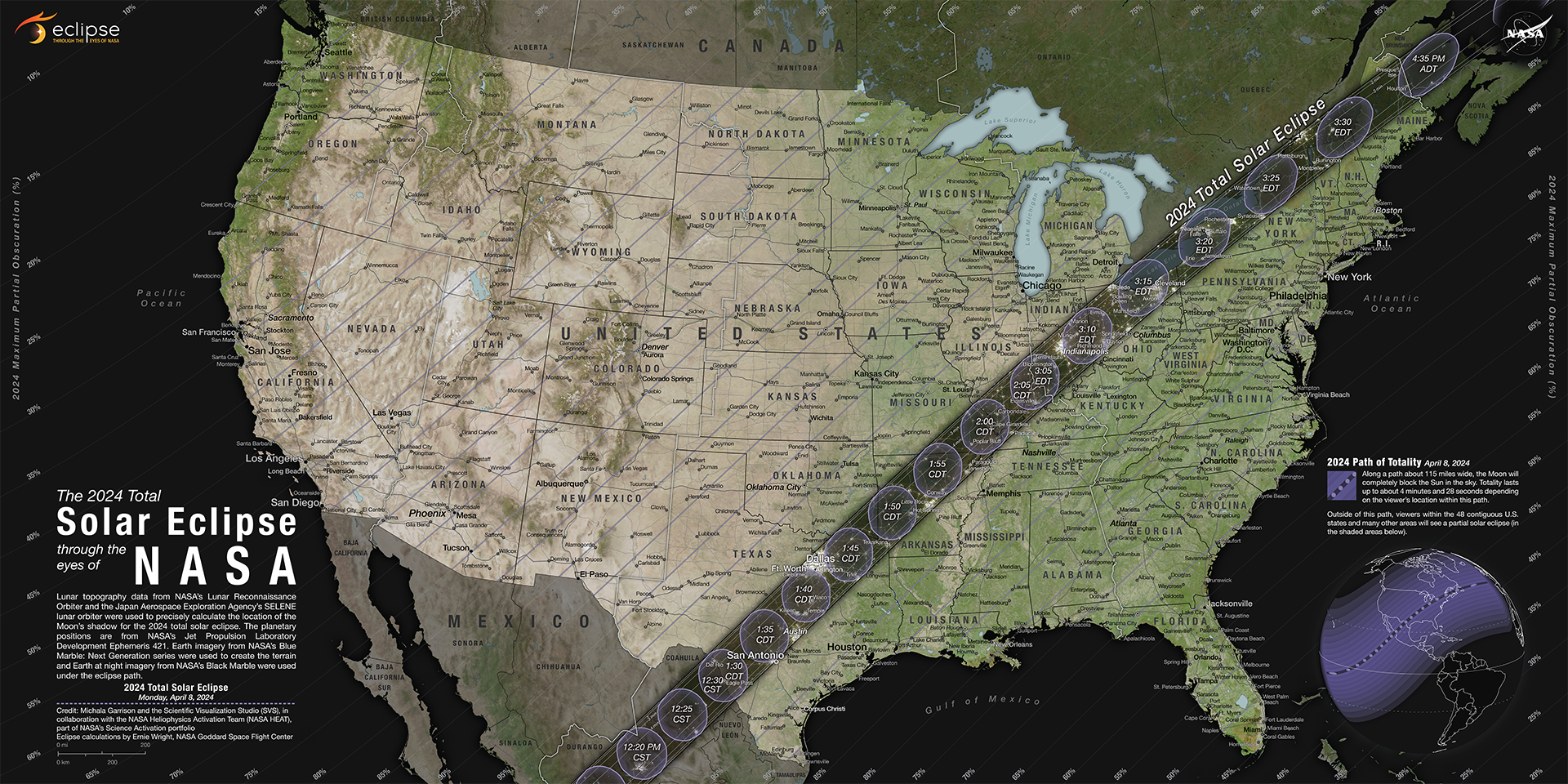There’s a celestial event on the horizon that’s worthy of marking your calendar for — a significant occurrence that will bring sky watchers and astronomy aficionados to a momentary standstill. On April 8, 2024, we will be graced with a total solar eclipse, a spectacle of cosmic proportions.

Eclipse 101: Understanding the Phenomenon 🌘
Before we dive into the specifics of the 2024 eclipse, let’s understand what happens during a solar eclipse. An eclipse takes place when the Moon passes between the Earth and the Sun, casting a shadow on the Earth and either partially or fully blocking our view of the Sun, depending on where you are on Earth. There are a few different types of solar eclipses: total, partial, and annular. A total solar eclipse — which we're focusing on here — occurs when the Sun is completely obscured by the Moon.
Mark Your Calendars: The 2024 Total Solar Eclipse 📅
After the appetizer of an eclipse in 2017, North America is set for the main course. The total solar eclipse on April 8, 2024, is eagerly awaited by eclipse enthusiasts. Why, you ask? This will be the first total solar eclipse visible in Canada since February 26, 1979, and the only one in the 21st century where totality can be seen across Mexico, the United States, and Canada.
 Source: NASA
Source: NASA
When and Where to Behold the Eclipse 🧭
This celestial dance will commence over the South Pacific Ocean and sashay onto North American shores on Mexico’s Pacific coast around 11:07 a.m. PDT. As the Moon’s shadow races northeastward, the path of totality will paint a celestial stripe across various states — from Texas to Maine.
To experience totality — when day momentarily turns to night — you’ll need to position yourself along this path. If you are within this narrow band of totality, you can see the complete obscuration of the Sun by the Moon, revealing the Sun's corona, which is normally hidden from view.
Noteworthy Spots for Eclipse Viewing 📍
- Texas: Kicks off the eclipse viewing with towns like Maverick and Falfurrias basking in the shadow.
- Midwest: Places such as Carbondale, Illinois, which witnessed the 2017 eclipse, will again be a prime spot.
- Northeast: In New York, cities like Rochester and Syracuse are on the radar.
- The Great White North: In Canada, cities like Toronto and Montreal prepare for the darkened Sun.
For those who are a bit out of the way, don’t fret. Partial eclipse views will be available for a much larger audience, so with the right equipment, you can still enjoy the show.

Timely Preparation: Gear-Up for Safety! ⚙️
Although it might be tempting to squint up at this spectacle, don't forget that looking at the Sun directly, even during an eclipse, can be harmful to your eyes. Protect your vision with special eclipse glasses that meet the ISO 12312-2:2015 standard, such as those available from Absolute Eclipse, recognized by the American Astronomical Society's Solar Eclipse Task Force.
Have the Universe at Your Fingertips 🌌
For those meticulous planners and sky enthusiasts who want to be up-to-the-minute informed, the perfect tool to have is Eclipse Timer. This savvy website helps you get accurate times and dates for solar eclipses occurring around the world or in your specific area.
Preparing for the 2024 Solar Eclipse: Tips and Tricks 🕶️
Eclipses don’t happen every day. When they do, they are amongst the most striking natural phenomena one can witness. Here’s how you can make the most of the 2024 Solar Eclipse:
- Location, Location, Location: Find your spot along the path of totality for the full experience.
- Guard Your Eyes: Ensure you have ISO-compliant eclipse glasses for safe viewing.
- Test Your Equipment: If you’re photographing the event, make sure to practice with your gear and filters.
- Pack Essentials: Prepare for a day outdoors — think food, water, seating, and weather-appropriate clothing.
- Arrive Early: Expect crowds, so get to your viewing spot early to stake out a good place.
- Stay Informed: Use sites like Eclipse Timer to know precise timing.

Beyond 2024: Future Eclipses to Anticipate ⏭️
After 2024, North America will take a break from total solar eclipses for a couple of decades. The next one will be the August 23, 2044 Total Solar Eclipse, threading its way across the Northwest Territories, Alberta, and even parts of Siberia!

The Social Impact of Eclipses: A Universal Bond 🌍
Eclipses are remarkable because they are shared experiences that cross geographical and cultural boundaries. They remind us of our shared humanity and our place within the cosmos. They foster community and ignite passions for science, exploration, and understanding.
Final Thoughts: Embrace the Darkening Sky ☀️🌑
The 2024 total solar eclipse presents an opportunity to witness one of nature's grandest spectacles. It’s a not-to-be-missed event that unites us all under the vast, wonderful sky. To ensure you're equipped for this astronomical exhibition, visit Absolute Eclipse and gear up for a safe and thrilling experience.
It's these little cosmic moments that connect us to the universe and to one another. Prepare to gaze up — responsibly, of course — and let the darkened Sun and the bright Corona enchant you. In a world that rarely stands still, this is one occasion where time might just seem to pause, even if for just a few minutes.
Will you be ready when the sky tells its tale?




















